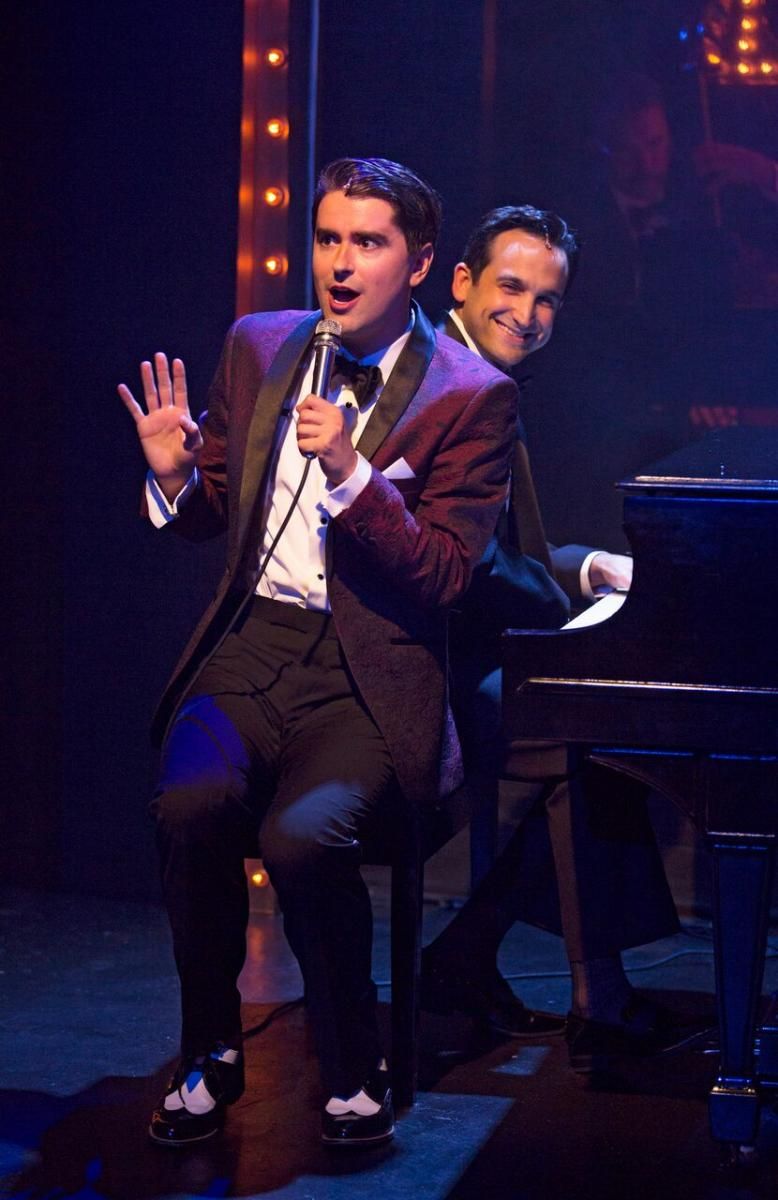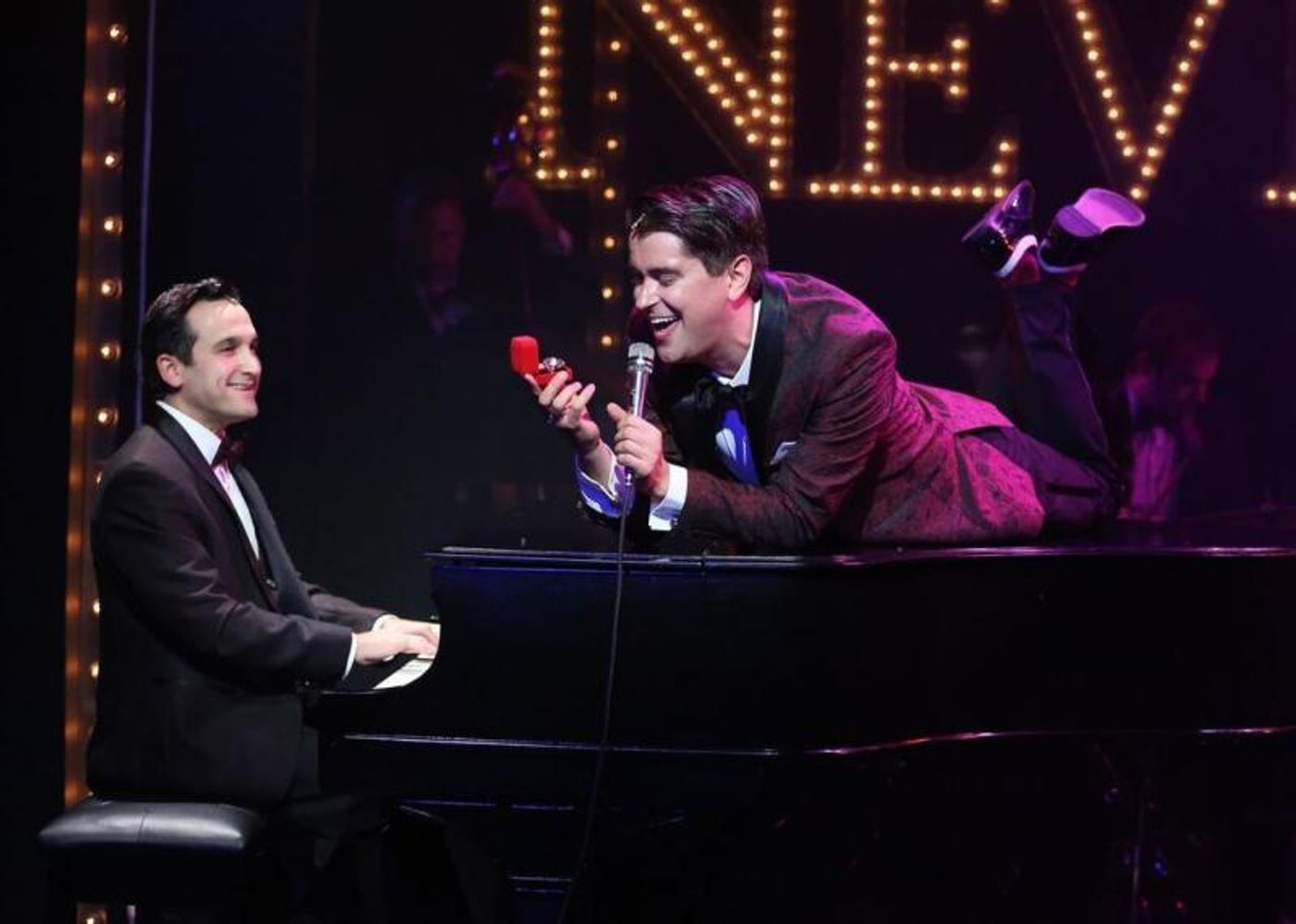Review: Mark Sonnenblick's Superb MIDNIGHT AT THE NEVER GET Mixes Song, Romance and Resistance
While it would be easy to exit the York Theatre these days having been absolutely swept away by Mark Sonnenblick's wonderfully engaging and ear-tingling score for his new musical, MIDNIGHT AT THE NEVER GET - a sumptuous collection mixing beautiful melodies framing lyrical poetics with jaunty numbers loaded with snazzy jokes and unexpected rhymes - it's the superb storytelling of his book, exploring issues of the 1960s gays rights movement in a universal manner that can apply to other civil rights battles, that makes the musical truly soar.

(Photo: Carol Rosegg)
As depicted by the author, Heaven is the opportunity to spend your afterlife forever in the time and place that gave you the most happiness. For cabaret singer Trevor Copeland, that means always being onstage with his songwriting love Arthur Brightman, as they were making names for themselves as the stars of a weekly midnight show at the hip Greenwich Village enclave The Never Get.
This was a time when being gay didn't just make you the target of intolerance and discrimination, it also made you a criminal. Even in the swanky venues of Christopher and Bleecker Streets,
"Gay bars were technically illegal in New York," explains Trevor, "but there were technically a lot of them run by enterprising businessmen who were technically the mafia."
So while police raids were frequent, the enterprising businessmen paid in advance to find out when their establishments were scheduled for a visit.
The story of romance and resistance is told as a 90-minute cabaret act narrated by Trevor, played with irresistible charm and wit by Sam Bolen, who co-conceived the show with Sonnenblick. Directed by Max Friedman and choreographed by Andrew Palermo, the energetic star displays great versatility singing and dancing through a dozen songs that, in context, were all written by Arthur. Behind him is music director/orchestrator Adam Podd's terrific five-piece ensemble and to his right, playing piano, is Jeremy Cohen; wry, sweet and understated as Trevor's memory of his love. (Jon J. Peterson also makes a very effective contribution, but to describe what it is would be a spoiler.)
When Trevor and Arthur began dating in the early 1960s, nobody would dare sing a gay love song in public. But Arthur grew tired of writing alternate lyrics to appease the straight public and although the audience was perplexed the first time Trevor sang a ballad with all male pronouns, attitudes began changing. Enough for the two to build up a following at their midnight frolics.
For Arthur, their show is a way of gaining acceptance by ingratiating themselves to the straight public through culture and entertainment. Trevor, however, has joined a more activist faction of the gay rights movement and when the tension of the outside world starts invading their safe musical home, it severely affects their relationship.

(Photo: Carol Rosegg)
Sonnenblick's score is filled with numbers that capture the grace and maturity of American Songbook standards without ever sounding like pastiche. Contemporary cabaret singers will certainly take note of the soaring passion of "The Mercy of Love," the jaunty patter of "Why'd'ya Hafta Call It Love?" ("What we are is happy, gay and stable / At least that's what we were before you gave it a label.") and the catchy swing of "The Bells Keep Ringing."
But there are also some top-notch novelty numbers like a backhanded tribute to Trevor's Idaho hometown and especially "My Boy In Blue," a scathing satirical number where Trevor sings that his new "boyfriend" is one of the undercover police officers who would pose as gay bar customers to arrest men who would respond to their advances. ("His Pontiac is green and black / The trouble is I always hafta sit in the back.")
Smart and romantic, funny and politically aware, Midnight at the Never Get is a knockout from start to finish. Mark Sonnenblick is a musical theatre writer to be watching for.
Reader Reviews
Powered by
|
Videos

